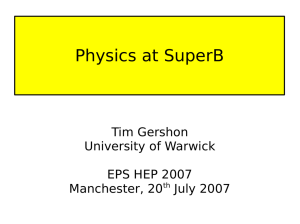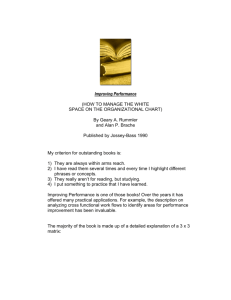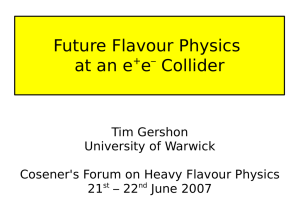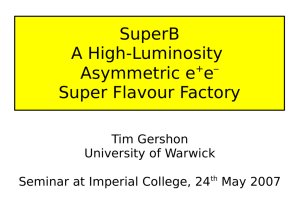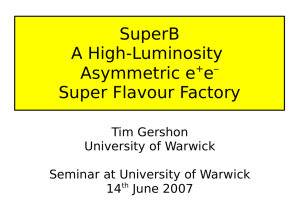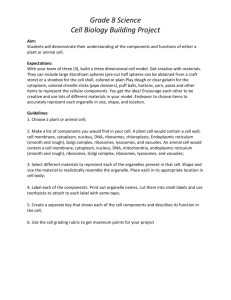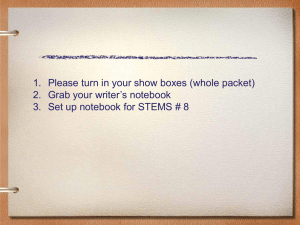Status of the B Tim Gershon University of Warwick
advertisement
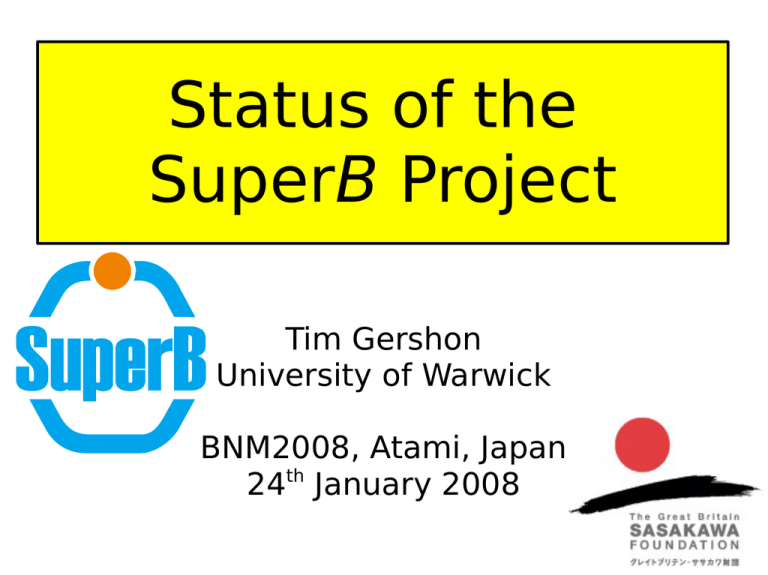
Status of the SuperB Project Tim Gershon University of Warwick BNM2008, Atami, Japan th 24 January 2008 Contents of this talk ● Brief reminder: what is SuperB? ● The Physics Case – ● Or: “Why 10/ab is Not Enough!” The Accelerator – Details in talk of Marica Biagini ● The Detector ● Recent progress and near future plans What is ● ? SuperB is – A Super Flavour Factory with Lpeak>1036/cm2/s – An asymmetric energy e+e– collider – ● Nominal 7 GeV e– on 4 GeV e+ at Υ(4S) ● Flexible running energy & beam polarization options Based on a new approach to collider design Avoid limitations due to high beam currents (high backgrounds, costly power bill, etc.) – The machine to measure new physics flavour couplings in the LHC era Conceptual Design Report INFN/AE­07/02, SLAC­R­856, LAL 07­15 Available online: http://www.pi.infn.it/SuperB Signatures breakdown by country 4 New Physics Discovery Scenarios 1) LHC discovers new physics – – – Can it be flavour blind? (ie. no signals in flavour) ● No, it must couple to SM, which violates flavour ● Any TeV scale NP model includes new flavoured particles What is the minimal flavour violation? (ie. worst case) ● NP follows SM pattern of flavour and CP violation ● SFF detects NP effects for particle masses up to >600 GeV What if NP flavour couplings are not suppressed? ● SFF measures NP flavour couplings and distinguishes models 2) LHC does not discover new physics – Problem for naturalness? ● – Not really – just an order of magnitude argument How to probe higher mass scales? ● NP models with unsuppressed flavour couplings can reach scales of 10s, 100s or even 1000s of TeV 5 Interplay With Energy Frontier LHC new physics discovery? YES NO Need to measure flavour parameters that cannot be studied at LHC Need alternative way to search for new physics beyond the LHC scale SuperB ● ● SuperB measurements obtain NP flavour structure “no lose”! LHC + SuperB begin to reconstruct NP Lagrangian ● ● SuperB discovery reach beyond LHC scale possible NP observation! Results inform future energy frontier programme 6 SuperB Design Necessities ● Cover large range of flavour observables – Flexible running energy B, D, τ – ● Possibility for beam polarization Precise measurements – Focus on theoretically clean observables – Minimize statistical and systematic errors ● Very high luminosity ● Improved detector performance ● Low backgrounds 7 SuperB Measurements 0 ' B K / K B K L B K l mK K md ASL Bd S Bd J/ K S S Bd K S B , , B DK CKM fits ms ASL B s S Bs J/ S Bs B b s ACP b s S B0 K S 0 S Bs B b d ACP b d ACP b ds S B0 0 − − AFB b s l l − B b s B b s l l B b d l l B B s l l − B Bd l l − B B l B e B e e − e g−2 EDM B B e B l l − l CPV EDM B D s l xD yD charm CPV SuperB “treasure chest” of new physics observables 8 Focus on theoretically clean channels DECREASING THEORETICAL UNCERTAINTY 9 table by M.Ciuchini Why 10/ab Is Not Enough! ● Just a few ex ample Lepton flavour violation s ... – Need a big push into the unexplored region ● Forward-backward asymmetry in b→sll – ● Rare B decays (B→K(*)νν, B→μ+μ-) – ● Must improve beyond 10% theory error of exclusive modes Prospects for observation marginal at 10/ab Null tests, such as CP violation in charm – Limited only by statistics 10 Lepton Flavour Violation ● Observable LFV signals predicted in a wide range of models, including those inspired by Majorana neutrinos Calibbi, Faccia, Masiero & Vempati, PRD 74 (2006) 11600 B ×10 7 Antusch, Arganda, Herrero & Teixeira, JHEP 0611 (2006) 090 SuperB sensitivity 11 SuperB much more sensitive to LFV than LHC (including τ→μμμ) Forward-Backward Asymmetry Exclusive: B→K*ll Beneke, Feldmann, Seidel EPJ C41 (2005) 173 Inclusive: b→sll Huber, Hurth, Lunghi arXiv:0712.3009 [hep-ph] Inclusive is much cleaner ⇔ need SuperB statistics 12 The Accelerator ● (Details in talk of M.Biagini tomorrow) ● Machine is based on ILC damping ring lattice – High luminosity through small emittance IP beam distributions for KEKB IP beam distributions for SuperB 13 New Collision Scheme ● Maximize overlap of beams even with finite crossing angle using “crab waist” ● Achieved through sextupole magnets ● Minimal beam distruption ⇒ ⇒ ⇒ ⇒ ⇒ High luminosity Low currents Small backgrounds Stable dynamic aperture Wall plug power ~20 MW 14 Maximize beam overlap with finite crossing angle Detector ● ● Currents and backgrounds similar to today's B factories – Existing detectors can largely be reused – CDR describes detector based on BaBar Upgrades motivated mainly by physics – – Smaller beam asymmetry ● high resolution vertex detector ● improvements to detector hermeticity Some other necessary upgrades ● new drift chamber; forward endcap; muon detection 15 Conceptual SuperB Detector BASELINE OPTION 16 Detector R&D ● Detector R&D ongoing for many subsystems – – – – vertex detector ● first layer close (~1cm) to beam spot ● use pixels or striplets to cope with occupancy particle identification ● improved readout for barrel (DIRC) ● forward PID device under consideration calorimeter ● CsI(Tl) too slow for endcaps → L(Y)SO? pure CsI? ● backward endcap under consideration electronics, trigger, DAQ & offline computing ● need to deal with high physics trigger rate 17 Potential SuperB site on the University of Rome Tor Vergata campus 18 Potential SuperB site on the University of Rome Tor Vergata campus 19 Footprint SPARX SuperB Ring (about 1800m) SuperB Injector (about 400m) Roman Villa 100m SuperB Main Building 20 by F.Forti Recent Progress and Future Plans ● ● CDR is being evaluated by an International Review Committee (IRC) Continuing work on – – – Physics case Detector R&D Accelerator design ● ● Beam tests ongoing at LNF – promising so far Expect IRC report April 2008 – – If positive, will request endorsement from CERN strategy group After this milestone, will request funding 21 International Review Committee • R. Petronzio, President of INFN, formed an International Review Committee to evaluate the SuperB CDR ● The committee members are: J. Dainton (chair) [UK] J. LeFrancois [France] H. Aihara [Japan] R. Heuer [Germany] Y.-K. Kim [US] A. Masiero [Italy] A. Seiden [US] D. Shulte [CERN] ● Meeting with the committee held November 2007 ● Requests for further information being responded to ● Expect final report April 2008 22 Ongoing Activity 23 SuperB cost and governance ● ● SuperB will proceed as a “regional initiative”, in line with the CERN Council Strategy group recommendation Total cost under 500 M€ – ● Approx. 350 M€ needed as new money Governance similar to XFEL & FAIR – International committee formed by the interested funding agencies 24 Summary ● ● The case for flavour physics in the LHC era is compelling – strong complementarity with energy frontier – requires peak luminosity Lpeak>1036/cm2/s SuperB is the ideal tool to explore the new phenomenology – ● based on a radically new accelerator concept Strong European initiative to probe this window on new physics – explore the flavour treasure chest by mid-2010s – expect further developments within 6-9 months 25 Back Up 26 CDR: cost estimate Engineering, Design, Inspection, Acceptance Materials & Services Costs are in 2007 € inflation adjusted Possible savings from reusing other hardware not yet considered in detail 27 Backgrounds ● Dominated by QED cross section – Low currents / high luminosity ● ● Beam-gas are not a problem SR fan can be shielded 28 Backgrounds and Detectors ● Backgrounds depend on various factors – luminosity ● ● – currents ● ● – radiative BhaBha scattering e+e– pair production synchrotron radiation beam-gas interaction beam size ● Touschek scattering ● beam-beam interactions main problem for SuperKEKB: beam backgrounds ~ 20 x today possible problem for SuperB: motivates smaller beam asymmetry (7 GeV on 4 GeV) ● Interaction point design & shielding requires care ● Detector can be based on existing BaBar / Belle 29 Interaction Region Design Supe r B Int e r a ct ion Re gion 20 Pink lines show backgrounds from B0 H 10 radiative BhaBha B0 L QF1 B0 0 H QD 0 H B0 0 L QD 0 QD 0 QF1 cm 0 3 .5 ­1 0 2 3 1 .5 1 0.5 1 1 . 52 3 QD 0 H 4 2 .5 3 .5 0 .5 4 .5 5 6 6 .5 2 .5 QF1 QF1 ­2 0 ­3 5.5 B0 H B0 L ­2 ­1 0 m 1 2 3 M .Sullivan N ov. 1 3, 2 0 06 SB_IT_ILC_G3 _3 00 Need serious amount of shielding to prevent the produced shower from reaching the detector. 30 Motivation ● Major challenge for particle physics in the next decade is to go beyond the Standard Model “relativistic” “quantum” New heavy particles produced on New heavy particles produced mass shell off mass shell (“virtual”) Sensitivity depends on: Sensitivity depends on: available centre-of-mass energy luminosity knowledge of Standard Model knowledge of Standard Model backgrounds backgrounds 31 Exploration of Two Frontiers 10 36 SuperB THE LUMINOSITY FRONTIER 32 Some Key Measurements CP Violation in Hadronic b→s Lepton Flavour Violation in τ Decay B → τν Rates & Asymmetries in b→sγ M(H+)/GeV SFF sensitivity @ 10ab-1 tanβ 33 Couplings and Scales k i k 4 i L=L SM ∑k =1 ∑i c Q ● k / New physics effects are governed by: – – new physics scale Λ effective flavour-violating couplings ci ● ● couplings may have a particular pattern (symmetries) coupling strengths can vary (different interactions) ● If Λ known from LHC, measure ci ● If Λ not known, measure ci /Λ 34 MFV Confronts the Data ● Current experimental situation – ● some new physics flavour couplings are small Minimal flavour violation – all new physics flavour couplings are zero MFV is a long way from being verified! Need to establish correlations between different flavour sectors (Bd,Bs,K) 35 36 M.Ciuchini at SuperB Review, LNF, 12 November New Physics Sensitivity in MFV ● ● ● Today Λ(MFV) > 2.3Λ0 @95C.L. SuperB Λ(MFV) >~6Λ0 @95C.L. NP masses >200GeV NP masses >600GeV analysis relies on CKM fits and improvements in lattice calculations only ΔF=2 (mixing) operators considered further improvements possible including also ΔF=1 (especially b→sγ) 37 Running at the Υ(5S) ● ● ● Belle & CLEO have demonstrated potential for e + – e → Υ(5S) → Bs(*)Bs(*) Some important channels, such as Bs→γγ, ASL(Bs) are unique to SuperB Problem: cannot resolve fast Δms oscillations – retain some sensitivity to φs, since ΔΓs ≠ 0 cf. D0 untagged measurement of φs 38 Large New Physics Contributions Excluded 0 ' B K / K B K L B K l mK K md ASL Bd S Bd J/ K S S Bd K S B , , B DK CKM fits ms ASL B s S Bs J/ S Bs B b s ACP b s S B0 K S 0 S Bs B b d ACP b d ACP b ds − B b s l l B b d l l AFB b s l l B b s − − B B s l l B Bd l l B B l B e B e e − e g−2 EDM B B e B l l − l CPV EDM xD yD charm CPV B Ds l − − 39 Will be Studied at SuperB 0 ' B K / K B K L B K l mK K md ASL Bd S Bd J/ K S S Bd K S B , , B DK CKM fits ms ASL B s S Bs J/ S Bs B b s ACP b s S B0 K S 0 S Bs B b d ACP b d ACP b ds S B0 0 − B b s l l B b d l l AFB b s l l B b s − − B B s l l B Bd l l B B l B e B e e − e g−2 EDM B B e B l l − l CPV EDM − s − B D l xD yD charm CPV 40 Will be studied at LHCb (+ upgrade) 0 ' B K B K l / K B K L mK K md ASL Bd S Bd J/ K S S Bd K S B , , B DK CKM fits ms ASL B s S Bs J/ S Bs B b s ACP b s S B0 K S 0 S Bs B b d ACP b d ACP b ds − B b s l l B b d l l AFB b s l l B b s − − B B s l l B Bd l l B B l B e B e e − e g−2 EDM B B e B l l − l CPV EDM xD yD charm CPV B Ds l − − 41 dashed box = exclusive modes only
